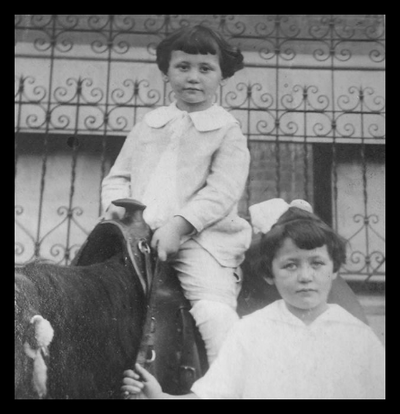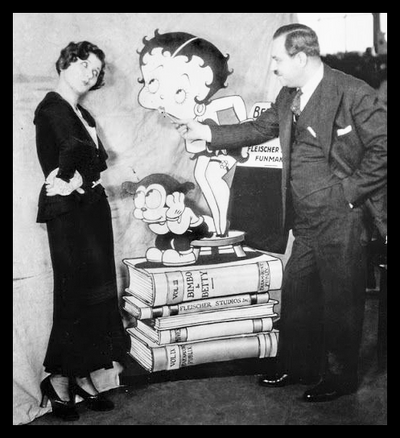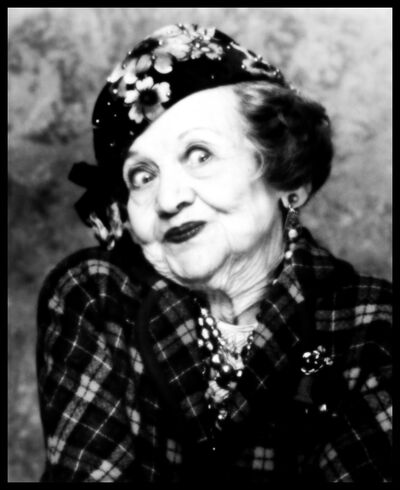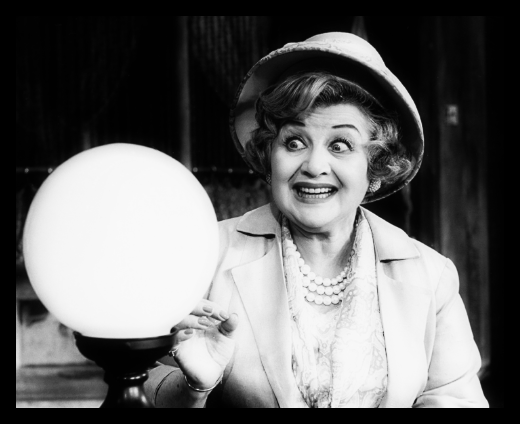Information:
|
|---|
Mae Kwestel (September 13, 1908 – January 4, 1998) was an American actress and voice artist best known for providing the voices for the animated characters Betty Boop and Olive Oyl. Mae was the daughter of Frieda Glauberman Kwestel a singer and dialectian and Simon Kwestel a Russian immigrant, who was in the embroidery business. Questel also had a brother, Robert Kwestel.
Questel was a child prodigy and was able to recite at the age of two and a half. Mae gave public performances at her school at charity benefits at the age of five, giving impressions at benefits. Questel performed in the Town Hall and Carnegie Hall and had played a small role in David Belasco's Broadway production of Daddy. Questel later took lessons with Joseph G. Geiger an elocution teacher. In 1923 Mae attended a Theater Guild school for a short time where she studied dancing, drama and singing.
Mae's Orthodox Jewish grandparents opposed a career in the theater and forced Mae to quit. When Mae graduated from Morris High School in New York City she told her parents she wanted to go on the stage but they objected, while living with them she gave private elocution lessons.
Mae married Leo Balkin, with whom she later had two children Robert Balkin (named after her brother) and Richard Balkin. After she married her parents thought she would forget about a theatrical career but she didn't. Two months after her wedding persuaded by her friends she entered a Helen Kane impersonation contest held at the RKO Fordham Theater in the Bronx. There Mae did an impersonation of the chubby Helen Kane singing "He's So Unusual" and won first place with $150 prize money and an autograph from Helen Kane, stating that Mae was another her. Her imitation impressed the RKO management which prompted them to offer her a contract to go on the vaudeville circuit. Against her grandparents wishes she signed the contract with the agency. Changing the spelling of her from Kwestel to Questel to rhyme with compel. Mae billed herself Mae Questel - Personality Singer of Personality Songs. Mae was then asked to perform "He's So Unusual" to a live audience at the Riverside Theatre. She would sometimes perform solo, and sometimes with partners and often appeared at the Palace on Broadway where she presented novelty songs and impersonations of Maurice Chevalier, Eddie Cantor, Marlene Dietrich, Mae West, Fanny Brice and Helen Kane. In 1929 Helen Kane had to cancel a performance at RKO Proctor's Fifty-eight Street Theater, Questel was called in to substitute for her.
In 1931 while working in vaudeville Mae heard that there was an audition for a girl to supply the the voice of Betty Boop in the cartoons, she applied for the role and was given the job making her debut as Betty Boop (a anthropomorphic French poodle who was loosely based on singer Helen Kane) in the 1931 Talkartoon Silly Scandals. The role of the character was shared with Margie Hines who was the original voice of Betty Boop, Little Ann Little, Bonnie Poe and Kate Wright. In the same year Questel was asked to portray Betty Boop in the live action Paramount film short Musical Justice opposite Rudy Vallée. According to a draft of the script, Betty Boop was originally to be played by Margie Hines. In 1932 the character debuted as a human girl in Stopping the Show. Mae was often asked to model while the animators drew the character and her impersonation technique and mannerisms were incorporated into the character. Mae was Betty's official voice and most famous and would "Boop-Oop-a-Doop" in over 100 cartoons featuring the character.
In 1933 Mae debuted as Olive Oyl, the character had been previously played by Bonnie Poe another actress who'd provided the voice for Betty Boop on radio. Poe's original portrayal of Olive was that of a scrapper with a deep Brooklyn accent, as based on E.C Segar's comic strip. Which according to cartoon historians made the character sound dopey. Mae's first cartoon as Olive was I Eats My Spinach, she suggested they create a new voice for the character. Mae decided to base Olive Oyl's new voice and mannerisms on actress ZaSu Pitts. The role of Olive Oyl was shared Hines and Poe. According to rare information, while Questel took over the full time role of Olive Oyl in 1933-1934 actress Bonnie Poe had taken over the role of Betty Boop. Starting in 1938, Hines replaced Questel as the voice of Olive Oyl during the transition to the Miami Studio. Around that time Questel retired from voice-over for a short time to start a family.
In 1943 Jack Mercer the voice of Popeye entered the armed forces and the creators held a Popeye Contest at the Fox Theater to find a new voice for the characters Popeye and Olive Oyl, it is unknown why Hines had retired from the role, according to information given she may have gone into defense work. The winners of the impersonation contest would be given a screen test at the Paramount Theater. Questel heard about this and one year later in 1944 returned to the role of Olive Oyl starting in The Anvil Chorus Girl after the Fleischer Studios had been reorganized as Famous Studios. A man won the role of Popeye but got mic fright, so Questel filled in and provided Popeye's voice in several shorts from 1945-1946. Famous was founded as a successor company to Fleischer Studios, after Paramount seized control of the aforementioned studio and ousted its founders, Max and Dave Fleischer, in 1941. Famous Studios productions included three series started by the Fleischers which was Popeye the Sailor, Superman, and Screen Song as well as Little Audrey, Little Lulu, Casper the Friendly Ghost, Honey Halfwitch, Herman and Katnip, Baby Huey, and the anthology Noveltoons series. Questel also had one uncredited Disney role in 1940 in Disney's Pinocchio and can be heard in the song "I've Got No Strings" where she, Patricia Page and Mel Blanc provide the voices for the puppets.
In the 1950s Mae was given the leading role of Winky Dink a character who was noted for his plaid pants, tousled star-shaped hair, and large eyes in the CBS children's show that aired from 1953 to 1957. The show has been cited as the first interactive TV show, especially in light of the magic drawing screen, a piece of vinyl plastic that would stick to the TV screen and on which kids would trace the action on the screen. Winky Dink was one of TV's most popular characters of the 1950s, the show was later revived in syndication for 65 episodes, beginning in 1969 and ending in 1973. In 2002 a Winky Dink and You DVD with magic kit was released.
In the 1960s Popeye was rebooted in a TV show entitled Popeye the Sailor which was produced for ABC through King Features, with a total of 220 episodes produced. Questel reprised her role as Olive Oyl, Swee'Pea and also provided the voice for The Sea Hag. The show was a sucess with high ratings.
In 1969 Questel made an appearance in the film Funny Girl, as based on the musical starring Barbra Streisand. The film was loosely based on comedian Fanny Brice. In Questel's earlier career she was known to impersonate Brice. In the film Questel plays Mrs. Strakosh and sings "If a Girl Isn't Pretty" with Kay Medford and Barbra Streisand. In that same year Mae first son Robert died on the 1st of May 1969.
In the 1970s Hanna-Barbera was given the rights to create a brand new Popeye the Sailor cartoon series, Mae auditioned for the role of Olive Oyl. Questel who had provided Olive Oyl's voice in the 1960s cartoons was rejected and replaced in favor of Marilyn Schreffler an actress who had done various voice-over roles for Hanna-Barbera. The studio press release at the time stated that they wanted a voice closer to the "original" Olive Oyl. Questel said to work on the cartoons she would have had to temporary live in Los Angeles and this was a move she didn't want to make. Although Questel wasn't given the role of Olive in the new Hanna-Barbera Popeye the Sailor series, in a 1980s interview Mae stated she still had a contract with King Features to voice the character.
In the 1973, Questel had a role on the short-lived ABC TV sitcom The Corner Bar, but was more famous for appearing as Aunt Bluebell in the TV commercials for Scott Towels. Questel also appeared in spots for Playtex, Folger's Coffee. According to Questel, she did six to seven commercials a year. During that time she also appeared on daytime soap operas and panel shows, including the Joe Franklin Show and more. Two years later Mae Questel appeared on the Tom Synder Show, Mae's appearance upset Little Ann Little who claimed she was the original voice of the animated character Betty Boop, and that she had proof to back up her claims. The actual original voice of Betty Boop was a Brooklyn girl by the name of Margie Hines. In most of Questel's interviews she would state that she was the only original voice of Betty Boop. Reason for this was that Mae was the official voice of Betty, as seen in the Fleischer Studios Victory Newsreel where she took center stage. Mae also went by the stage name Mae "Betty Boop" Questel.
In 1983 Mae Questel reprised her role as Olive Oyl for a Popeye video game commercial. In the same year Questel was contacted by Woody Allen who gave her a small part in his film feature Zelig as Helen Kane where she performed "Chameleon Days" with a 45-piece orchestra.
In 1985 Questel was contacted to do the voice of Betty Boop in The Romance of Betty Boop but her voice had dropped and the creator of the film short had wanted to go in a different direction and decided to hire another actress to do the role. Three years later Questel was contacted to reprise her role as Betty Boop in the 1988 film Who Framed Roger Rabbit. Around that time Woody Allen wanted to use Questel for another project, but she was busy with Who Framed Roger Rabbit and she had stated it was hard to think of leaving the Disney project.
In 1989 Questel was contacted first to provide the voice of Betty Boop in Betty Boop's Hollywood Mystery as the people who had worked behind the film had wanted it to be like the original series but Mae was busy filming a segment for Wood Allen's New York Stories. Instead the role of Betty went to another actress.
Mae made her final appearance in the 1989 live-action film National Lampoon's Christmas Vacation as Aunt Bethany a character who suffered from Alzheimer's disease. Questel herself suffered from early stages of Alzheimer's.
In 1990 Questel appeared at Grim Natwick's 100th Birthday party where she sung "Button Up Your Overcoat" around that time Mae had descended into the depths of Alzheimer's disease and could no longer issue accurate reports from animation's past. The banquet hall was filled with animation veterans dating back to the medium's pre-World War I beginnings alongside contemporary talents from such projects as The Simpsons. Animation historians attempted to extract secrets from Questel but were unable to as Questel couldn't seem to remember anything.
Questel died in 1998 at the age of 89 from complications related to Alzheimer's disease in her Manhattan apartment. She was buried in West Babylon, New York's New Montefiore Cemetery. Mae lies in the Zwicker Family Plot. Her survivors include her son Richard Balkin and three granddaughters.
In popular media, Mae is best remembered as the original voice of Betty Boop and Olive Oyl, among many other characters she voiced which air on TV networks that air old cartoons. In 2016 the audio of Mae singing the tune of Helen Kane's 1929 hit "Ain'tcha" from the 1932 cartoon The Betty Boop Limited was used as a video intro sequence by a YouTuber by the name of Jbunzie and has been seen by over "11,417,682" people worldwide, making the song one of Questel's most popular song recordings to date, which was the same song Questel performed on the Radio Keith Orpheum Program on WEAF (and the NBC Red Network) on Thursday, December 19, 1929. Mae is referenced in The Fleischer Story which was released by Leslie Cabarga in 1976. Questel is referenced in the Out of the Inkwell: Max Fleischer and the Animation Revolution which was released in 2005 including ZaSu Pitts: The Life and Career by Charles Stumpf which was released in 2010, and again in Popeye: An Illustrated Cultural History by Fred M. Grandinetti which was released in 2012. Questel's legacy lives on through Betty Boop, this Wiki is tribute to her unique talents as a talented performer that once graced earth.
Gallery:
Links:
Mae Questel (Behind the Voice Actors)
Mae Questel (Animation World Magazine)



































